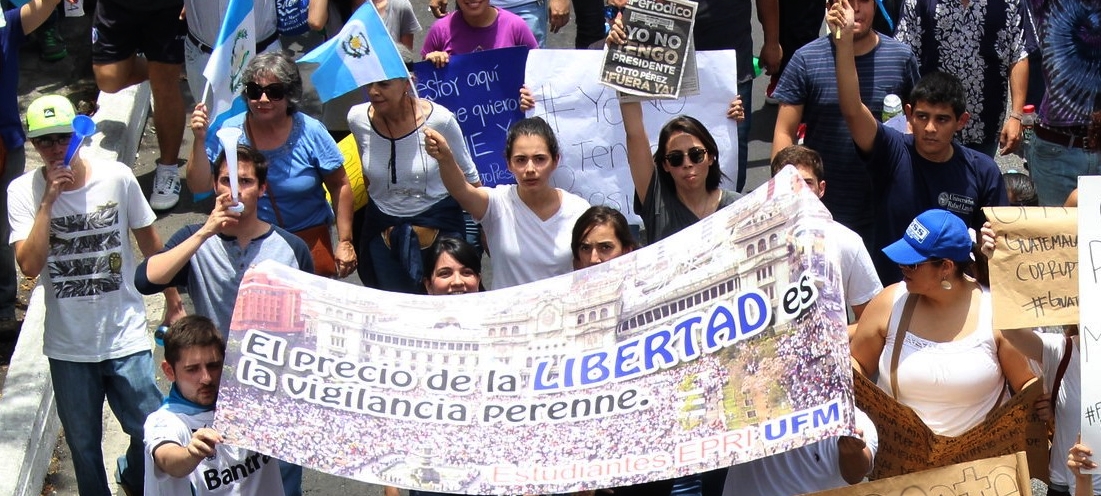Two Steps Back and a Half Step Forward on Corruption in the Northern Triangle

As recently as 2015, optimism about efforts to counter corruption in Central America’s Northern Triangle was high. Today, only El Salvador is still making progress. International assistance will remain important to making headway in countering the regional threat of corruption.
Corruption enables all kinds of criminal activities that make life miserable and daily survival uncertain. Outside the rule of law, drug kingpins buy government officials and threaten citizens. Shady businessmen squash competition and create a toxic regulatory environment that kills new enterprises and job prospects. Corrupt politicians find ways to steal taxpayer money, which contributes to public distrust of government. Crime, dysfunctional economies and poor governance all drive forced migration, making corruption a shared regional problem.
The Northern Triangle countries of El Salvador, Guatemala and Honduras have long struggled with egregious corruption. Plagued by drug cartels, violent gangs and weak institutions, the political commitment to fight corruption within Northern Triangle democracies waxes and wanes. Today, of the three countries, only El Salvador has a record of prosecutions and is asking for international assistance to keep its anti-corruption efforts going.
It was not too long ago that Guatemala was hailed as a model of how to curb corruption in the region. In 2006, the Guatemalan government asked the United Nations (UN) for assistance in combatting illegal armed groups, criminal networks, as well as strengthening the police and courts to take on sensitive impunity cases. The result was the UN-backed International Commission against Impunity in Guatemala (CICIG), which enabled prosecutions of numerous criminal organizations, gangs and drug traffickers. CICIG’s zenith came in 2015, when it helped prosecutors bring down some two dozen public officials, including the president and vice president participating in a major bribery scheme.
Outgoing President Jimmy Morales, once a CICIG supporter, soured on the body once it began investigating his brother and son as well as Morales himself for campaign finance anomalies. In January 2019, Morales announced that he would not renew CICIG’s mandate and tried to expel its personnel. The Guatemalan Congress even created a committee to investigate the CICIG for possible crimes. On a visit to Washington, D.C., in August, President-elect Alejandro Giammattei promised to renew Guatemala’s fight against corruption but stopped short of seeking outside assistance.
The situation is even more pessimistic in Honduras. Since adopting civilian, democratic rule in 1982, a small cadre of corrupt politicians, drug traffickers and violent gangs have all exploited state weakness. In 2015, the U.S. Department of Justice accused a former Honduran vice president and two members of his family of laundering drug money. The same year, a former president’s son was extradited to the United States for trafficking drugs while the sitting president, Juan Orlando Hernández, admitted that he had accepted campaign contributions from officials who stole $330 million from the Honduran Social Security Institute.
When popular demonstrations protesting the theft of pension funds gained strength, Hernández negotiated the creation of a four-year Mission in Support of the Fight against Corruption and Impunity in Honduras (MACCIH). The mission went into force in 2016 and its mandate includes strengthening justice institutions. Unlike CICIG, however, it has no co-investigative authority. The Honduran Congress watered down the already weak MACCIH by passing legislation that diverted cases from investigation by the body. Last month, U.S. prosecutors accused Hernández of accepting $1.5 million in drug proceeds in his 2013 campaign as part of a larger investigation into his brother Juan Antonio Hernández, who is awaiting trial in the United States on narcotics and weapons trafficking charges.
For now, El Salvador is the only Northern Triangle country that seems to be gaining traction in the corruption fight. A great deal of El Salvador’s progress is due to the efforts of former Attorney General Douglas Meléndez, an experienced prosecutor and anti-corruption crusader who was elected attorney general by the Legislative Assembly in 2016. As attorney general, he created an anti-impunity unit with two dozen prosecutors assigned to high-profile cases. That team sent Antonio Saca, a former president, to prison for embezzling and laundering $300 million in public funds, and extradited another former president, Mauricio Funes, on similar charges involving $351 million, though Funes fled to Nicaragua. Meléndez also prosecuted his own predecessor for money laundering and blocking investigations into prominent businessmen.
Meléndez was not renewed for another term this year, although newly elected President Nayib Bukele has promised to carry forward the anti-corruption fight. Bukele signed an agreement with the OAS on September 6 to create an International Commission against Impunity in El Salvador (CICIES). However, instead of working with an independent attorney general, the new body would collaborate with the National Police and executive branch, limiting its mandate and raising concerns over whether its focus could turn political.
Significant challenges to fighting corruption remain in all three Northern Triangle countries. International assistance can offer officials and citizens key tools to help succeed in their anti-corruption efforts. To this end, IRI has worked with the Guatemalan Congress as it created laws mandating more transparent contracting processes, trained investigative journalists in techniques to uncover corruption, and shared best practices with mayors in all three countries on fiscal transparency and accountability. The expansion of these and other efforts to fight corruption will be important to helping solve the problems driving people from their homes in the Northern Triangle and to promoting regional stability.
Top